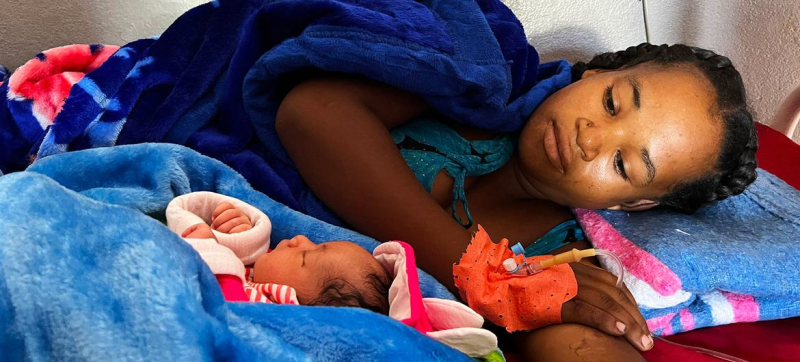- Depositors stranded as Sammilito Islami Bank is in liquidity crisis |
- BNP faces uphill task to reach seat-sharing deal with allies |
- Bangladesh rejects India’s advice; vows free, fair polls |
- Hadi’s condition very critical: Singapore Foreign Minister |
- Asia-Pacific hunger eases, Gaza pipeline fixed, Europe hit by flu |
Global Abuse in Childbirth Persists, WHO Warns

A mother in Madagascar rests with her newborn at a hospital in the south of the country.
New evidence suggests mistreatment remains common in maternal and newborn care, with research across four countries finding that 60 per cent of vaginal exams were performed without consent, according to the World Health Organization (WHO).
Over the past decade, growing evidence has highlighted the widespread impact of mistreatment and the need to place respectful care at the centre of all maternal and newborn health strategies.
WHO’s Human Reproduction Programme (HRP) and partners released a new compendium on Wednesday aimed at ending mistreatment and promoting respectful maternal and newborn care. The compendium features the latest evidence and guidance on best practices.
From policymaking to clinical settings and community services, the compendium outlines actionable steps to uphold the rights, needs, and preferences of women, newborns, parents, and families.
Mistreatment during childbirth takes many forms, from neglect and abuse to non-consensual medical procedures. An earlier WHO-supported study found that 40 per cent of women in four countries experienced some form of abuse or discrimination during labour or childbirth. Some reported being slapped, shouted at, or forcibly restrained.
Researchers also found that more than four in 10 women across these countries were physically or verbally abused during childbirth, with some experiencing discrimination. Additionally, up to 75 per cent of extremely sensitive procedures were carried out without consent.
“Too often, women are not part of decision-making and are treated with contempt or even abuse,” said WHO’s Dr Hedieh Mehrtash.
“Respectful maternal and newborn care needs to be embedded and integrated into policy and practice,” WHO stated. The compendium provides practical resources for countries, urging health systems to proactively embed dignity, equity, and respect into every aspect of maternity and newborn care—building on WHO’s 2014 statement on preventing disrespect and abuse.
Highlighting critical areas where mistreatment is often overlooked, WHO’s compendium offers programme managers essential background to build a foundational understanding of mistreatment and respectful care, aiming to make respectful practices the norm.

